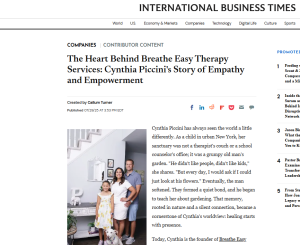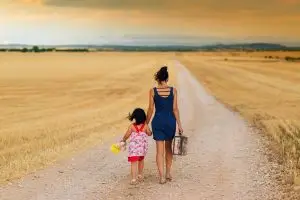The holidays can be a time of reunion and renewal, even amidst the frantic shopping, cleaning, or baking rush that historically occupies the last month of the year.
But for many who have lost loved ones, the holidays can remind them how things have drastically changed in their lives and routines.
This can be true for adults and children alike. Many may feel the loss of a loved one or caregiver because of the COVID-19 pandemic. According to Covid Collaborative (2021), approximately one out of every 450 U.S. children and adolescents under 18 lost a caregiver because of the virus as of November 2021.
Losses don’t have to be recent to be intensely felt, however. While grief and loss are universal, everyone deals with the effects differently (Mayo Clinic, 2022).
Indeed, the ripple effect of loss can lead to myriad symptoms. For instance, a loss can manifest as depression, grief, anger, and anxiety. According to the Mayo Clinic (2022), grief can alter brain chemistry, cause muddy thinking, and impact concentration. These effects can be amplified when faced with the holidays –unofficially dubbed “The Most Wonderful Time of the Year.”
It’s not surprising that many have the instinct to hide from the holidays and their associated events through substances or avoidant behavior, believing that the trauma of experiencing loss in those contexts will be too painful to bear. According to the Mayo Clinic (2022), this avoidance only delays the inevitable. In extreme cases, avoidant behavior can manifest in a phenomenon called Complicated Grief (CG). A relatively new addition to the Diagnostic and Statistical Manual of Mental Disorders (DSM), CG affects approximately 7% of bereaved adults and is characterized by avoidance of reminders, recurrent distressing emotions, and intrusive thoughts about a loved one (Baker et al., 2016).
Just as everyone experiences grief differently, healing from loss can take many routes. Some steps can be taken during the emotionally-charged holidays to lessen the effects of grief and loss. The creation of new rituals, for example, may soothe the soul. Others may find solace in talking about their loss, playing a song, or looking at pictures to commemorate the loss with others (Mayo Clinic, 2022).
Experts suggest taking time to maintain healthy routines and diets to diminish the effects of grief and loss exacerbated by cheery movie families or festive social media posts. Similarly, attending to mental health needs through counseling, reaching out to friends, or online communities are also effective strategies. Even something as simple as joining an online game can help fill the need for outreach, which is essential during difficult times. For instance, Captari, Riggs, and Stephen (2021) found that individuals with support networks could more efficiently process grief from sudden loss. If none are viable, you can volunteer at a local charity, such as a soup kitchen or toy drive, to achieve interaction and change perspective.
Check out these tips below for ideas on how to survive the holiday season.
- Socialize: Visit with friends or volunteer at a local charity.
- Stay Healthy: Maintain habits to combat stress.
- Create New Rituals: Play a song, look at pictures, share stories
- Take a Break: Honor your process and take a night off.
- Move: Exercise and breathing exercises increase feel-good hormones
Don’t hesitate to contact Breathe Easy Therapy for more information on our services related to grief counseling and coping strategies.
References
Baker, A. W., Keshaviah, A., Horenstein, A., Goetter, E. M., Mauro, C., Reynolds, C., 3rd, Zisook, S., Shear, M. K., & Simon, N. M. (2016). The role of avoidance in complicated grief: A detailed examination of the Grief-Related Avoidance Questionnaire (GRAQ) in a large sample of individuals with complicated grief. Journal of loss & trauma, 21(6), 533–547. https://doi.org/10.1080/15325024.2016.1157412
Captari, L. E., Riggs, S. A., & Stephen, K. (2021). Attachment processes following traumatic loss: A mediation model examining identity distress, shattered assumptions, prolonged grief, and posttraumatic growth. Psychological Trauma: Theory, Research, Practice, and Policy, 13(1), 94–103. https://doi.org/10.1037/tra0000555
Covid Collaborative. (2021). Hidden Pain: Children Who Lost a Parent or Caregiver to COVID-19 and What the Nation Can Do To Help Them. https://www.covidcollaborative.us/
Mayo Clinic. 2022. Grief and loss throughout the holiday season. https://www.mayoclinichealthsystem.org/hometown-health/speaking-of-health/grief-and-loss-throughout-the-holiday-season





